The war in Ukraine has precipitated a renewed relationship between Russia and North Korea. Driven by Russia’s need for ammunition for the war, and North Korea’s need for food, energy, and military technology, these burgeoning ties pose challenges for the U.S., and its allies in Europe and the Indo-Pacific region. In Europe, North Korea’s assistance may allow Putin to prevail in Ukraine when U.S. support is in question. In Asia, Russian military technology could advance North Korea’s military satellite, nuclear submarine, and ICBM programs.
CSIS Korea Chair research has focused on the munitions trade and the associated policy challenges posed by Moscow and Pyongyang.
Imagery Studies
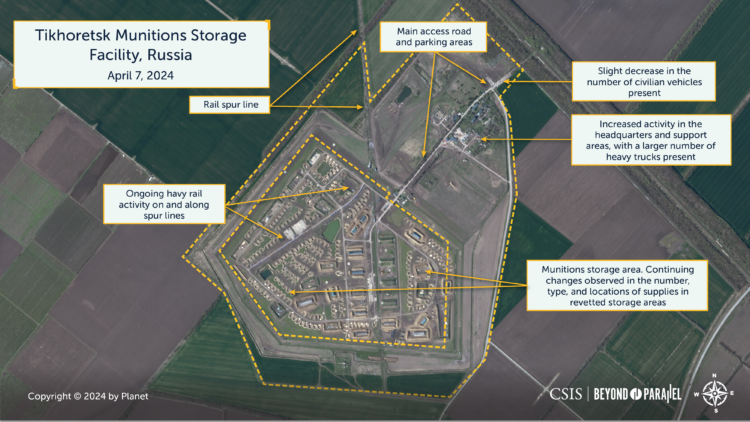
Ongoing Activity at Russia’s Tikhoretsk Munitions Storage Facility
Satellite imagery from April 7, 2024, reveals an ongoing high-level utilization of the Tikhoretsk Munitions Storage Facility, with around 55% of its 280 storage revetments occupied—essentially the same as in February 2024.

Major Munitions Transfers from North Korea to Russia
Ammunition supplies have become critical in the Ukraine war. CSIS studied hundreds of commercially available satellite images since August 2023 on the continuing transfer of large quantities of munitions between North Korea and Russia.
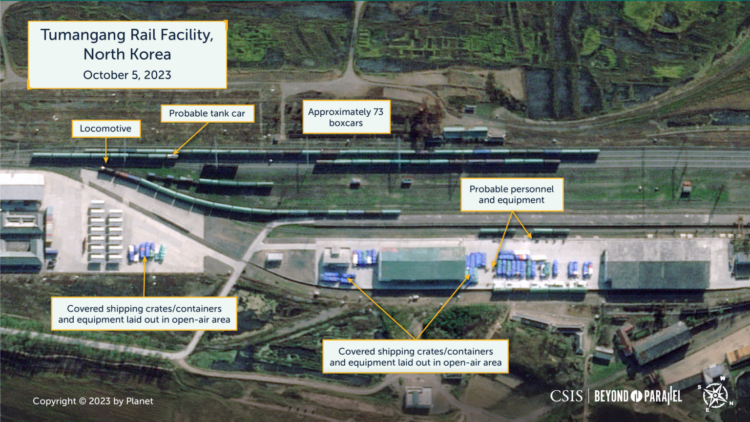
Dramatic Increase in DPRK-Russia Border Rail Traffic After Kim-Putin Summit
A few weeks after the Kim-Putin summit, satellite imagery show an unprecedented level of rail traffic at the DPRK-Russia border. The level of rail traffic is far greater than what Beyond Parallel has observed at the facility during the past five years, even compared to pre-Covid-19 levels.
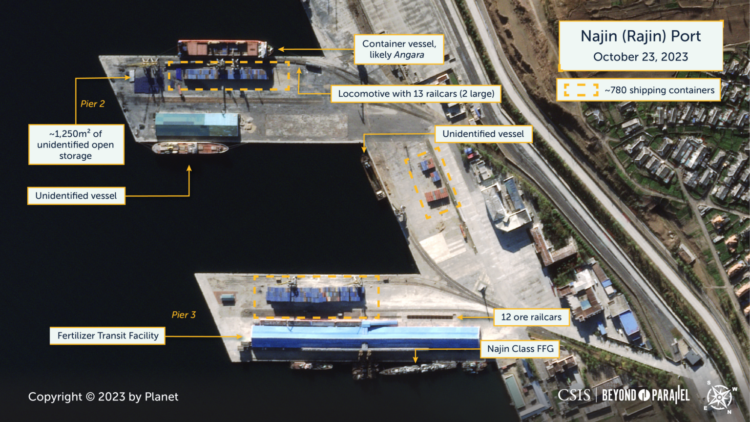
Activity at Najin Points to Continued DPRK-Russia Arms Transfers
Satellite imagery analysis of Najin Port over the past two months shows that the port has been handling a significantly high level of activity. Given the White House confirmation that the port has been involved in the transfer of North Korean munitions to Russia, the recently observed activities suggest that such transfer activities are continuing.
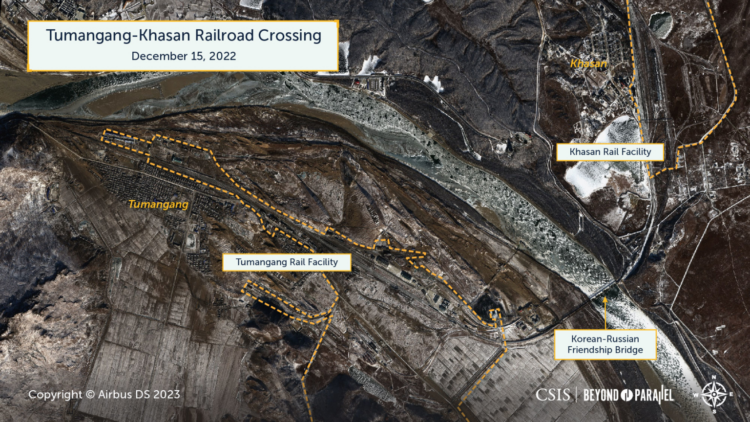
Arms for Energy: War Brings Together Russia and North Korea
Analysis of recent commercially available satellite imagery of the Russia–North Korea railroad crossing suggests significantly increased energy and economic trade between the two countries as Pyongyang seeks to tighten ties with Moscow.
Interactive Map of North Korean munitions routes to Russia
Policy Analysis
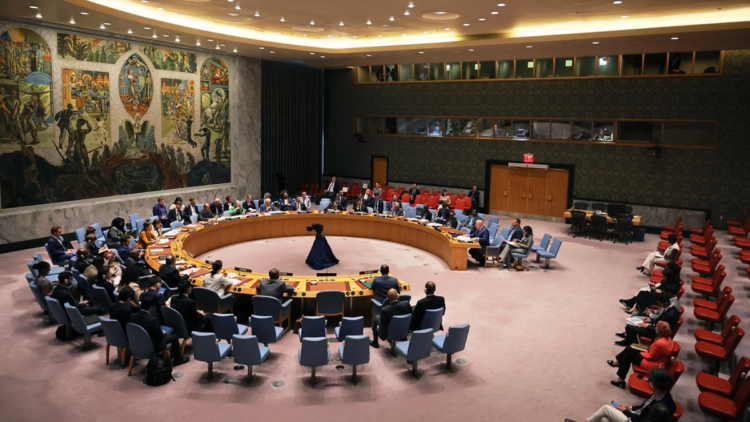
Russia’s Veto: Dismembering the UN Sanctions Regime on North Korea
On March 28, Russia vetoed a UN resolution renewing the mandate of the UN Panel of Experts (PoE), which monitors UN member states’ enforcement of the UN sanctions regime on North Korea. Among the 15 countries currently sitting on the UN Security Council (including South Korea and Japan), Russia was the only country that rejected the annual renewal. China abstained. Russia’s veto will effectively end the mandate for the PoE, which expires at the end of April 2024.
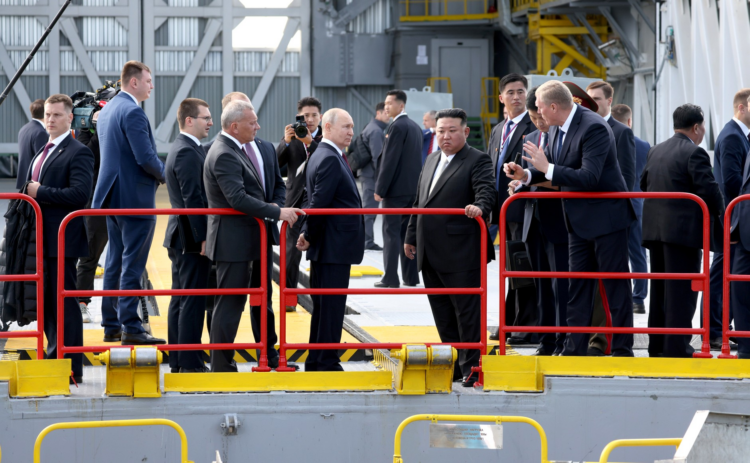
A Renewed Axis: Growing Military Cooperation Between North Korea and Russia
The White House’s acknowledgement this week of North Korean leader Kim Jong-un’s possible trip later this month to meet Russian president Vladimir Putin is only the latest evidence of a growing military alignment between North Korea and Russia.
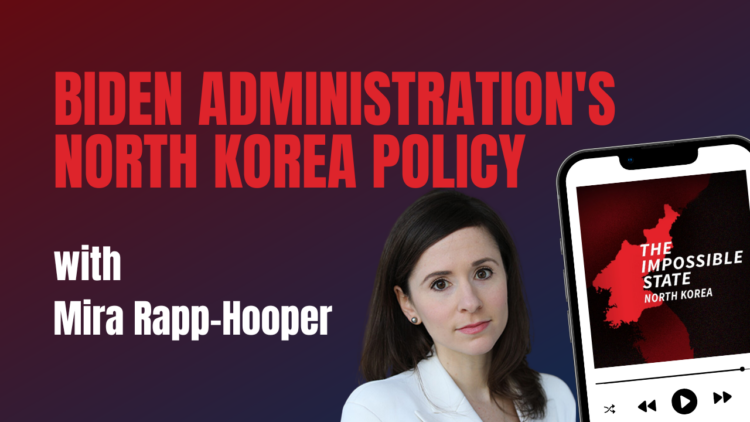
Biden Administration’s North Korea Policy
In this featured conversation at The JoongAng-CSIS Forum 2024, Dr. Mira Rapp-Hooper, Special Assistant to the President and Senior Director for East Asia and Oceania at the National Security Council, White House discussed with Dr. Victor Cha the Biden Administration’s North Korea policy, and burgeoning partnership between North Korea and Russia.
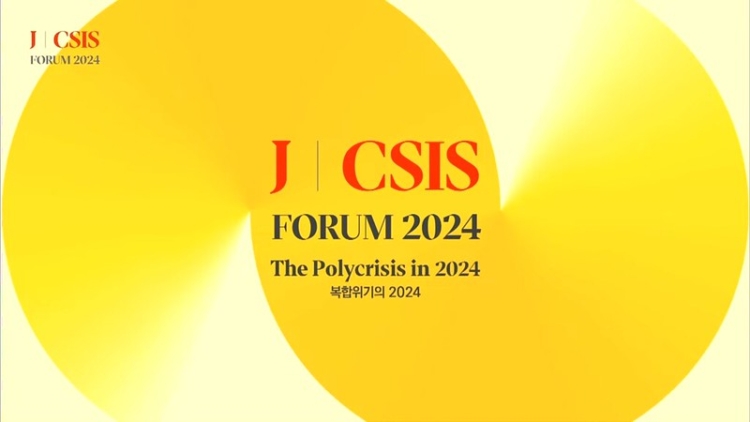
How to Deal with North Korea-China-Russia
At The JoongAng-CSIS Forum in Seoul on March 4, 2024, top experts including former ROK foreign minister Yoon Young-kwan, Dr. Victor Cha, Ms. Allison Hooker, Amb. Shin Jung-Seung, Amb. Shin Kak-soo, and Amb. Wi Sung-lac joined to discuss the important question of how to deal with the worrisome partnership and relationship between North Korea, China and Russia.
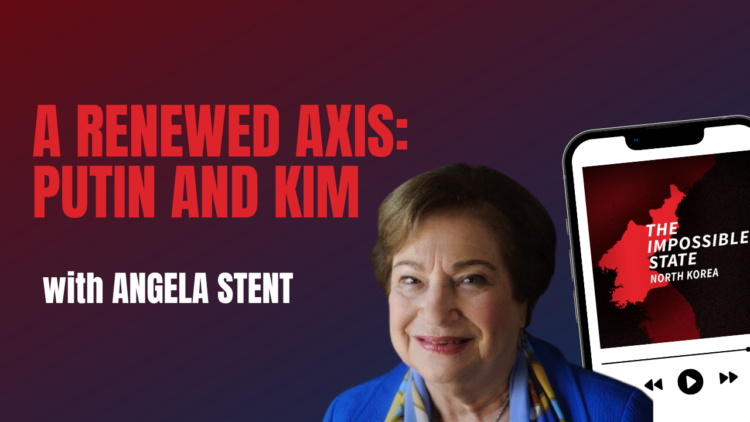
What motivated Putin to turn to North Korea and meet with Kim Jong-un? How does this summit impact Russia and the rules-based international order? Dr. Angela Stent, Director of the Center for Eurasian, Russian and East European Studies and Professor of Government at Georgetown University joined Dr. Victor Cha and Dr. Ellen Kim on the Impossible State.
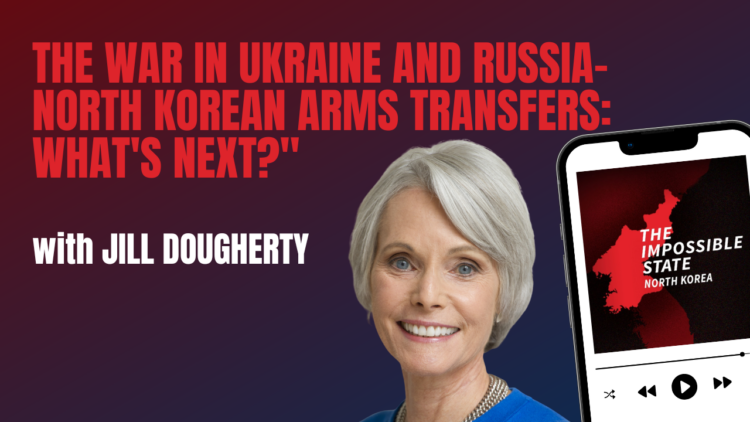
The War in Ukraine and Russia-North Korean Arms Transfers: What’s Next?
What is Putin’s view of the current situation in the Russia-Ukraine conflict? What is the significance of China’s support for Russia’s war and its cooperation with the DPRK? Ms. Jill Dougherty, Adjunct Professor at Georgetown University’s Center for Eurasian, Russian and East European Studies and former CNN’s Moscow Bureau Chief and Correspondent joined Dr. Victor Cha on the Impossible State.
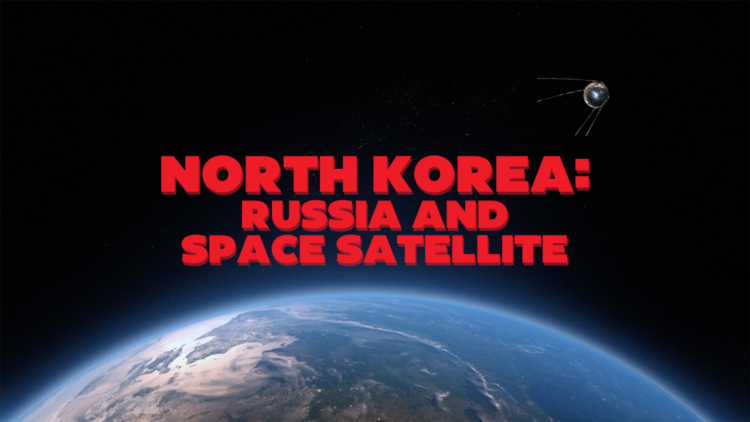
The Capital Cable:
North Korea, Russia and Space Satellite
In November 2023, North Korea successfully launched a space satellite into orbit. On the Capital Cable, Gen. (ret.) Curtis “Mike” Scaparrotti, former commander of UNC/CFC/USFK from 2013 to 2016, and former Commander of US European Command and Supreme Allied Commander Europe from 2016 to 2019 joined Dr. Victor Cha, Amb. Mark Lippert and Dr. Sue Mi Terry to discuss what this means for the growing North Korea-Russia partnership.
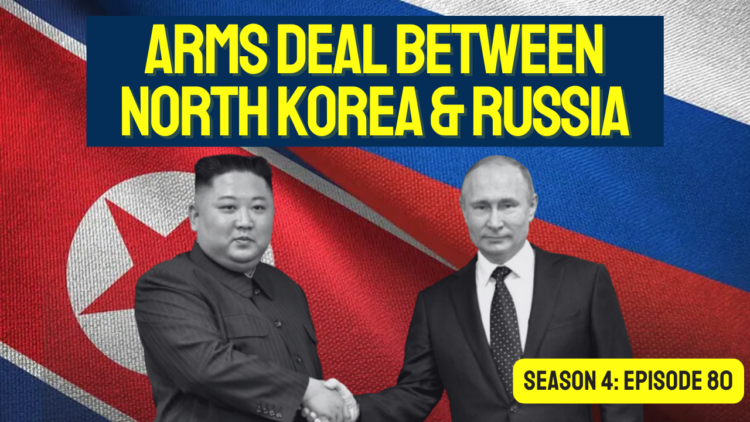
The Capital Cable:
North Korea-Russia Arms Cooperation
The White House revealed North Korea transferred more than 1,000 containers of arms to Russia for the war in Ukraine in exchange for Russian weapons and technology. On the Capital Cable, Mr. Joseph Bermudez Jr, Senior Fellow for Imagery Analysis at CSIS joined Dr. Victor Cha, Amb. Mark Lippert and Dr. Sue Mi Terry to discuss.
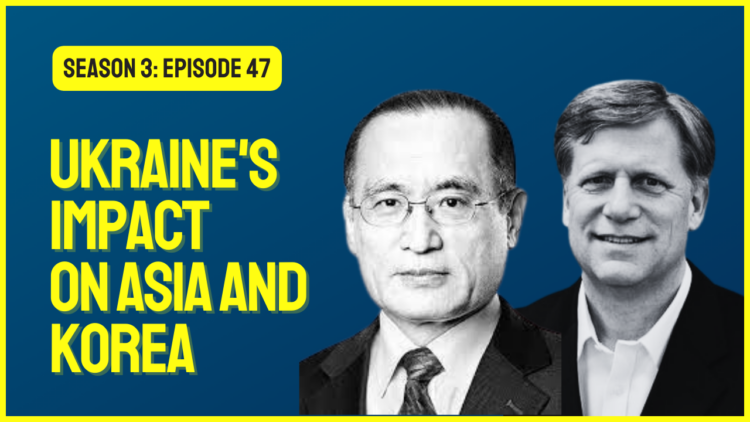
The Capital Cable: Ukraine’s Impact on Asia and Korea
The crisis in Ukraine and the way that the US and Europe are responding to Putin’s war on the global order has implications for Asia and Korea. On the Capital Cable, Amb. Wi Sung-lac, former ROK ambassador to Russia, and Amb. Michael McFaul, former U.S. ambassador to Russia joined us to discuss how the war in Ukraine affects the Indo-Pacific and the Korean peninsula.
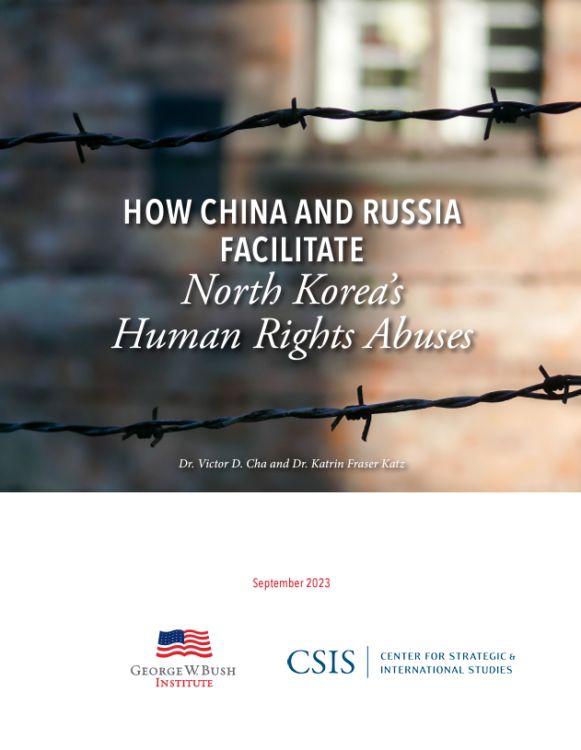
How China and Russia Facilitate North Korea’s Human Rights Abuses
The North Korean regime focuses all available resources on its top strategic objective: its own survival. This CSIS and George W. Bush Presidential Center report examines China and Russia’s roles in perpetuating North Korea’s human rights abuses and explores how recent global developments including the Covid-19 pandemic and the war in Ukraine have presented North Korea with new incentives and opportunities for repression.

The Transfer of a Russian ICBM to North Korea?
North Korea’s Hwasong-18 ICBM and its July 12, 2023 successful launch is likely the result of technical cooperation sourced to Russia. The reported physical dimensions and flight trajectory data of the Hwasong-18 is nearly identical to that of the Russian Topol-M ICBM (SS-27 Mod 2).
